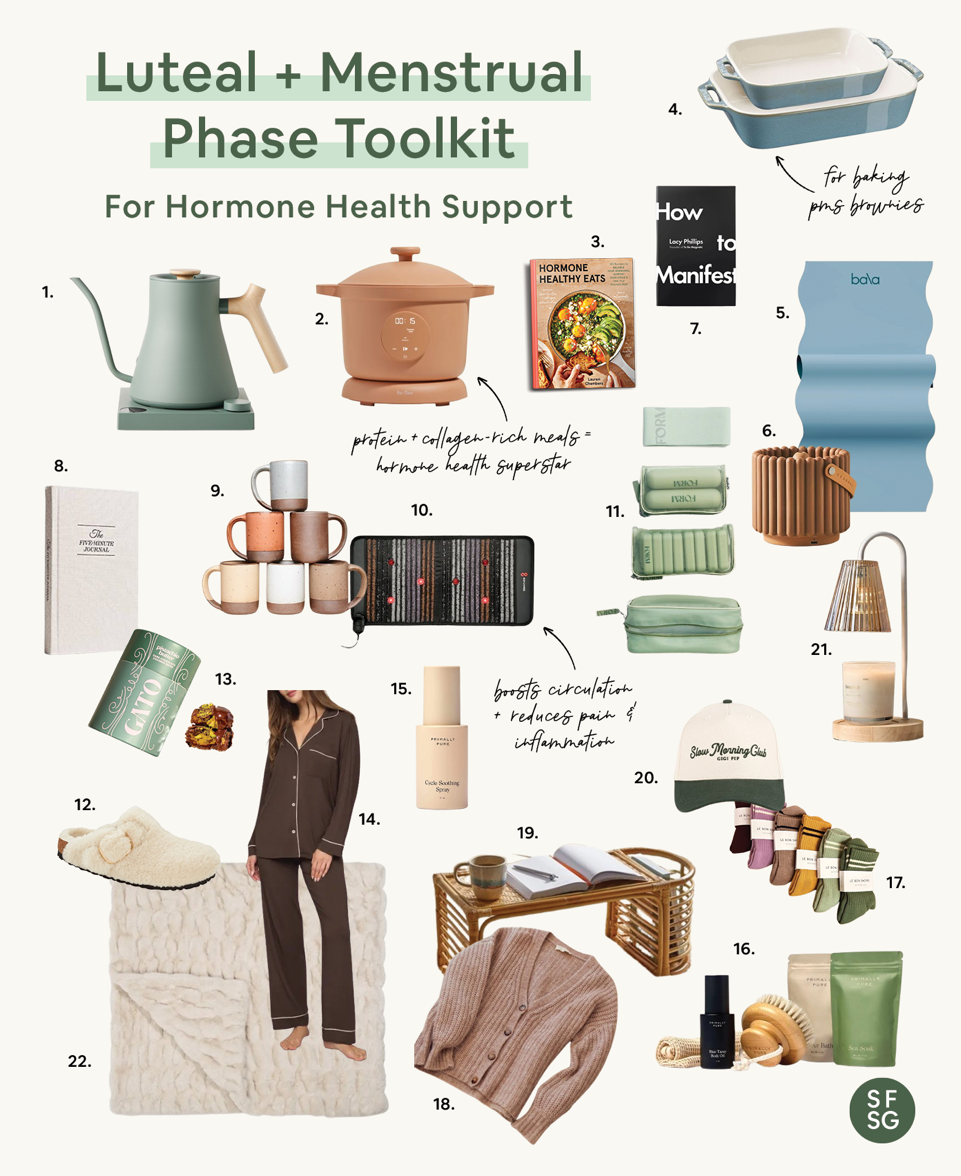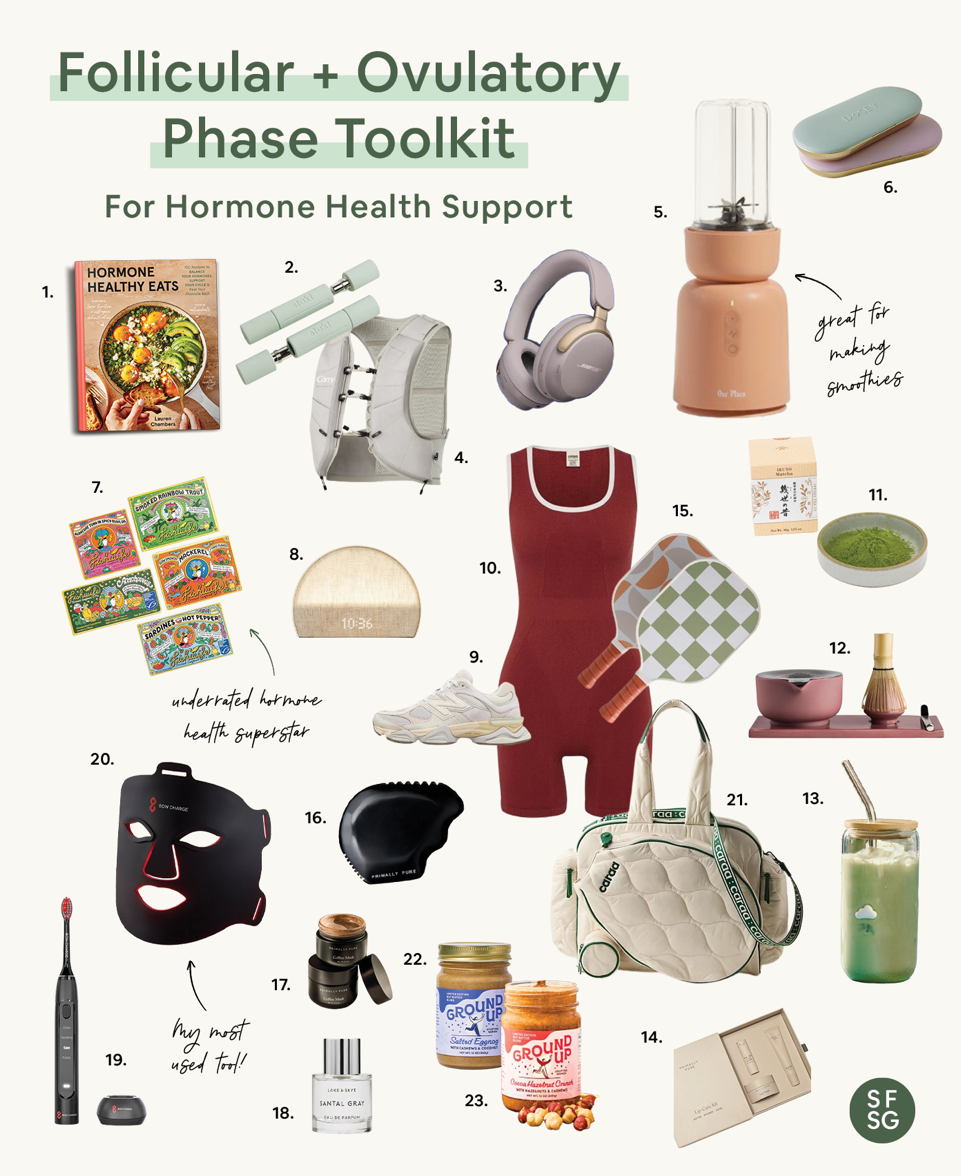recipes
lifestyle
wellness
motherhood
mindset
About
E-Books
Blog
Freebies
partnerships
hi, i'm lauren!
hey there!
I’m on a hot mission to help you balance your hormones & live your best life.
categories
Home
Quiz
Get In Touch
The Course
search:
Cookbook
Recipe key
GF
VG
P
Vegan
Gluten Free
Paleo
DF
Dairy-Free
download now
Join Hormone Healthy Eats!
Become a SFNSG insider to get my monthly Substack, Hormone Healthy Eats! Packed with the latest hormone-healthy recipes
+ tips.
jump to recipe >
Chances are if you’re in the preconception period (i.e. preparing to get pregnant in the future) you’re already shopping for a prenatal vitamin, or currently taking one, which is great!
However as a nutrition + hormone health coach who specializes in fertility, I’ve found there’s an overwhelming amount of prenatal vitamins to choose from (literally thousands), and not all are created equal.
Because a prenatal vitamin can have a huge impact on your fertility and pregnancy health (not to mention baby’s development) it’s important to invest in a product with the most bioavailable forms of nutrients your body can use and reap the benefits from, which unfortunately aren’t found in most mainstream brands.
This is why I thought it was important to share a breakdown of what exactly to look for when choosing a high quality prenatal supplement, as well as an honest and thorough review on my preferred prenatal multivitamin (which I personally used during my second pregnancy) — Modern Fertility Prenatal Vitamins.
Looking for more support (including recipes, supplements, lifestyle tips, etc.) on your preconception path to a healthy pregnancy and baby? Check out this guide.
Looking for more support (including recipes, supplements, lifestyle tips, etc.) on your preconception path to a healthy pregnancy and baby? Check out this guide.
WHY PRENATAL VITAMINS ARE IMPORTANT DURING PRECONCEPTION
Taking a prenatal vitamin is typically one of the first things your doctor will advise you on when trying to conceive, and for good reason.
Consuming and absorbing enough nutrients (both from the food you eat and the supplements you take) is a key component of optimal fertility and a healthy pregnancy, especially in the 90 days prior to conception, which is when both the quality of egg and sperm begin developing (i.e. the egg and sperm you end up getting pregnant with were actually developed three months beforehand).
It’s no wonder researchers from the Obstetrics and Gynecology Division of the Columbia University Medical Center believe the preconception period to be just as crucial to mom and baby’s health as what happens once the fetus is in utero.
Bottomline, if you anticipate a pregnancy in your near future, it’s never too early to begin incorporating more nutrients into your diet, from both a food and supplement standpoint. The more nourished you are, the more your body has to nourish baby!
WHAT TO LOOK FOR WHEN CHOOSING A QUALITY PRENATAL VITAMIN
So now that we’ve covered just how crucial optimal nutrient consumption and absorption is, affecting everything from egg and sperm health to an optimal cycle, conception, pregnancy and baby, let’s cover the nutrients that should be included in any prenatal vitamin you select (all recommended and backed by the American College of Obstetricians and Gynecologists, ACOG).
+ Folate
It’s critical to select a prenatal vitamin with folate, which is a nutrient essential for fetal neural tube (brain and spine) development. Methylfolate is the biologically active form of folate, meaning it’s easier for your body to absorb and utilize. Look for a minimum of 400 mcg from your prenatal vitamin.
+ Choline
Also vital for fetal neural tube development, and a nutrient most mainstream prenatal vitamins are lacking. Because our bodies only make a small amount and depend largely on our diets for this nutrient (which is highest in liver, eggs, beef, fish and poultry) many pregnant women simply don’t get enough, so it’s important to supplement. The ACOG recommends 450 mg.
+ Omega-3’s
Critical for fetal brain and retina development. Another one many women are deficient in, as largely derived from wild-caught fish and grass-fed/pasture-raised animal products via diet.
+ Iron
The building block of hemoglobin, a blood protein that transports oxygen, and (you guessed it), a nutrient derived from diet that many pregnant women can become deficient in (especially with all of those food aversions). Look for minimum 18 mg.
+ Vitamin A
Supports good vision, healthy skin and a functioning immune system. The ACOG recommends 770 mcg.
+ Vitamin B6
Boosts protein metabolism for both you and your baby and assists in forming red blood cells. Look for 1.9 mg.
+ Vitamin B12
Plays a key role in central nervous system function. The ACOG recommends 2.6 mcg. Look for the activated form of B12, which is more bioavailable and will be listed as methylcobalamin.
+ Vitamin C
Promotes the growth of all connective tissue and makes it easier for your body to absorb iron, another critical nutrient for a healthy conception, pregnancy and baby (see above). Look for 85 mg.
+ Vitamin D3
Increases absorption of calcium from food (which optimizes bone density, immune function and development). Aim for 600 IU’s.
+ Iodine
Critical for thyroid health, which is an essential component of fertility, a healthy menstrual cycle, pregnancy and baby. The ACOG recommends 220 mcg.
+ Calcium
While the ACOG recommends 1,000 mg per day of calcium to help build strong bones and teeth, pairing it with iron and other nutrients can block the absorption, so it’s generally advised to take a separate calcium supplement at a different time of day or include plenty of calcium-rich foods in your diet like leafy green vegetables, full-fat dairy and high quality fish/seafood.
WHAT TO AVOID WHEN CHOOSING A QUALITY PRENATAL VITAMIN
+ Inflammatory Dyes, Soybean, Maltodextrin & Fillers
Artificial dyes and coloring, soybean oil and maltodextrin are commonly found in mainstream supplements and are highly inflammatory, causing side effects ranging from intestinal issues to behavioral problems to blood sugar spikes.
+ Nutrient Levels Over The Recommended Daily Intake
It may seem like a “good thing” but higher doses of these nutrients can actually make you feel sick, the last thing you want when you’re TTC or pregnant.
+ Non-Bioavailable Forms of Nutrients
As mentioned above, many prenatal vitamins contain folic acid instead of folate/methylfolate, which is the active form your body can actually utilize and reap the benefits of. Make sure B12 is active as well, also known as methylcobalamin.
+ Gummy Form
There have been many issues reported with accurately controlling the amount of nutrients and ingredients represented in gummy form, something you don’t want to mess with when it comes to the health of your baby.
+ Lacking Essential Nutrients
As mentioned above, most mainstream prenatal vitamins lack folate (substituting it for folic acid) as well as choline, which is just as essential for neural tube development. Make sure the prenatal vitamin you select contains the nutrients and doses listed above.
BENEFITS OF MODERN FERTILITY PRENATAL VITAMINS
+ Contains Bioavailable Forms of All Nutrients + Correct Doses Recommended By The ACOG
When selecting a quality prenatal vitamin, my top criteria includes ensuring it contains the most bioavailable forms of correctly dosed nutrients as recommended by the ACOG, which the Modern Fertility Prenatal Vitamins do (with the exception of calcium, which it leaves out due to blocked nutrient absorption and replaces with vitamin D and zinc, which work to naturally boost calcium absorption).
+ Capsules Are Infused With A Hint of Citrus
For me, it’s the little details that can make a big difference, and this lovely infusion helped ease nausea and actually had me look forward to taking my Modern Fertility Prenatal Vitamins each day.
+ Convenient and Sustainable Subscription Service
I’m BIG on supplement subscription services, which ensure you stick with your habit and never run out and then forget to take/order more. I also LOVE that Modern Fertility’s Prenatal Vitamin subscription service reduces waste and packaging by sending you one reusable glass jar and refills shipped in a pouch, making it a much more eco-friendly option.
+ No Negative Side Effects
As mentioned above, many mainstream prenatal vitamins contain fillers, preservatives, higher doses of nutrients over the RDI, or non-bioavailable forms of nutrients, making them much harder to digest and absorb and often leading to tummy troubles. The Modern Fertility Prenatal Vitamins don’t contain any of these ingredients, and as a result I didn’t experience any tummy troubles or adverse side effects.
MY PERSONAL EXPERIENCE WITH THE MODERN FERTILITY PRENATAL VITAMINS
As you might have guessed based on the above benefits, I was really impressed with the quality and convenience of the Modern Fertility Prenatal Vitamins. They checked all the boxes in terms of bioavailable forms of nutrients, dose requirements, voidness of fillers or inflammatory ingredients, and a convenient subscription service with low-waste packaging. I also became obsessed with the citrus infusion, which made it actually kind of fun to take.
MODERN FERTILITY PRENATAL VITAMIN DISCOUNT CODE + SAVINGS
If you’re in the market for a quality prenatal multivitamin, you can use this link to save $5 off the Modern Fertility Prenatal Multivitamin.
BOTTOMLINE
Because a prenatal vitamin can have a huge impact on your fertility and pregnancy health (not to mention baby’s development) it’s important to invest in a product with the most bioavailable forms of nutrients your body can use and reap the benefits from. I hope you find the information in this post helpful in guiding you to make the decision that feels best for you and your baby’s health.
OTHER FERTILITY RESOURCES YOU MAY FIND HELPFUL
+ How To Optimize Ovulation, Boost Fertility + Increase Your Odds of Getting Pregnant Naturally
+ Conceiving After Miscarriage — My Personal Journey + Hormone-Balancing Tips
+ Free Fertility Boosting Foods Download + Guide
Disclosure: This is a product review blog post and I received the complimentary products from Modern Fertility. I test all of the products thoroughly, and all opinions are my own. I am an independent blogger and may earn a small commission (at no cost to you) should you choose to purchase through the links in this post.

If you loved that...

01.

02.

03.

04.

05.
hey!
Keep Browsing
Site
Keep Browsing
Site
the
about
e-books
blog
downloads
quiz
Welcome friend, I'm lauren.
I’m honored to support you on your journey to optimal hormone health + happiness. Thanks for being here babe.


